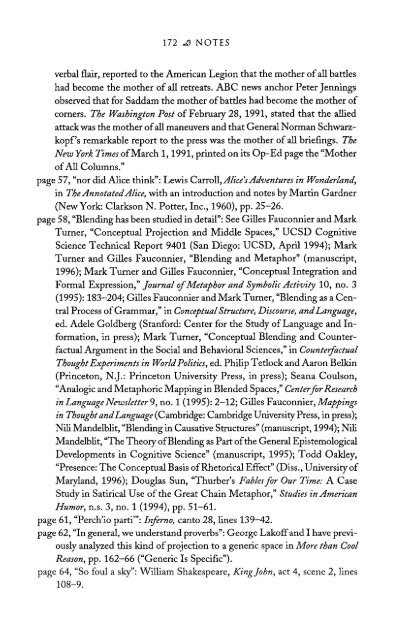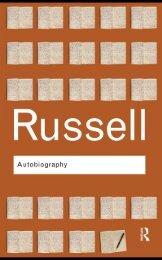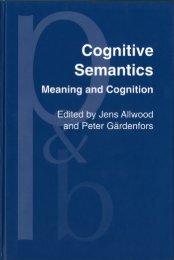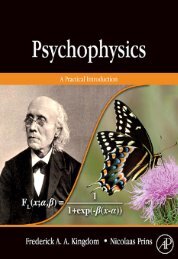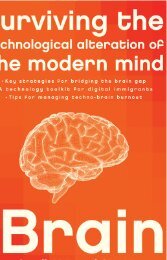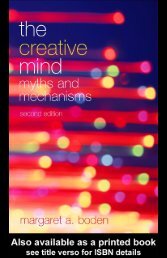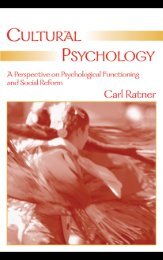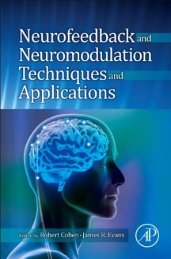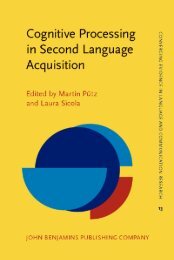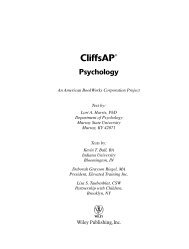The Literary Mind.pdf
The Literary Mind.pdf
The Literary Mind.pdf
You also want an ePaper? Increase the reach of your titles
YUMPU automatically turns print PDFs into web optimized ePapers that Google loves.
172 NOTES<br />
verbal flair, reported to the American Legion that the mother of all battles<br />
had become the mother of all retreats. ABC news anchor Peter Jennings<br />
observed that for Saddam the mother of battles had become the mother of<br />
corners. <strong>The</strong> Washington Post of February 28, 1991, stated that the allied<br />
attack was the mother of all maneuvers and that General Norman Schwarzkopf's<br />
remarkable report to the press was the mother of all briefings. <strong>The</strong><br />
New York Times of March 1, 1991, printed on its Op-Ed page the "Mother<br />
of All Columns."<br />
page 57, "nor did Alice think": Lewis Carroll, Alice's Adventures in Wonderland,<br />
in <strong>The</strong> Annotated Alice, with an introduction and notes by Martin Gardner<br />
(New York: Clarkson N. Potter, Inc., 1960), pp. 25-26.<br />
page 58, "Blending has been studied in detail": See Gilles Fauconnier and Mark<br />
Turner, "Conceptual Projection and Middle Spaces," UCSD Cognitive<br />
Science Technical Report 9401 (San Diego: UCSD, April 1994); Mark<br />
Turner and Gilles Fauconnier, "Blending and Metaphor" (manuscript,<br />
1996); Mark Turner and Gilles Fauconnier, "Conceptual Integration and<br />
Formal Expression," Journal of Metaphor and Symbolic Activity 10, no. 3<br />
(1995): 183-204; Gilles Fauconnier and Mark Turner, "Blending as a Central<br />
Process of Grammar," in Conceptual Structure, Discourse, and Language,<br />
ed. Adele Goldberg (Stanford: Center for the Study of Language and Information,<br />
in press); Mark Turner, "Conceptual Blending and Counterfactual<br />
Argument in the Social and Behavioral Sciences," in Counterfactual<br />
Thought Experiments in World Politics, ed. Philip Tetlock and Aaron Belkin<br />
(Princeton, N.J.: Princeton University Press, in press); Seana Coulson,<br />
"Analogic and Metaphoric Mapping in Blended Spaces," Center for Research<br />
in Language Newsletter 9, no. 1 (1995): 2-12; Gilles Fauconnier, Mappings<br />
in Thought and Language (Cambridge: Cambridge University Press, in press);<br />
Nili Mandelblit, "Blending in Causative Structures" (manuscript, 1994); Nili<br />
Mandelblit, "<strong>The</strong> <strong>The</strong>ory of Blending as Part of the General Epistemological<br />
Developments in Cognitive Science" (manuscript, 1995); Todd Oakley,<br />
"Presence: <strong>The</strong> Conceptual Basis of Rhetorical Effect" (Diss., University of<br />
Maryland, 1996); Douglas Sun, "Thurber's Fables for Our Time: A Case<br />
Study in Satirical Use of the Great Chain Metaphor," Studies in American<br />
Humor, n.s. 3, no. 1 (1994), pp. 51-61.<br />
page 61, "Perch'io parti'": Inferno, canto 28, lines 139—42.<br />
page 62, "In general, we understand proverbs": George Lakoff and I have previously<br />
analyzed this kind of projection to a generic space in More than Cool<br />
Reason, pp. 162—66 ("Generic Is Specific").<br />
page 64, "So foul a sky": William Shakespeare, King John, act 4, scene 2, lines<br />
108-9.


